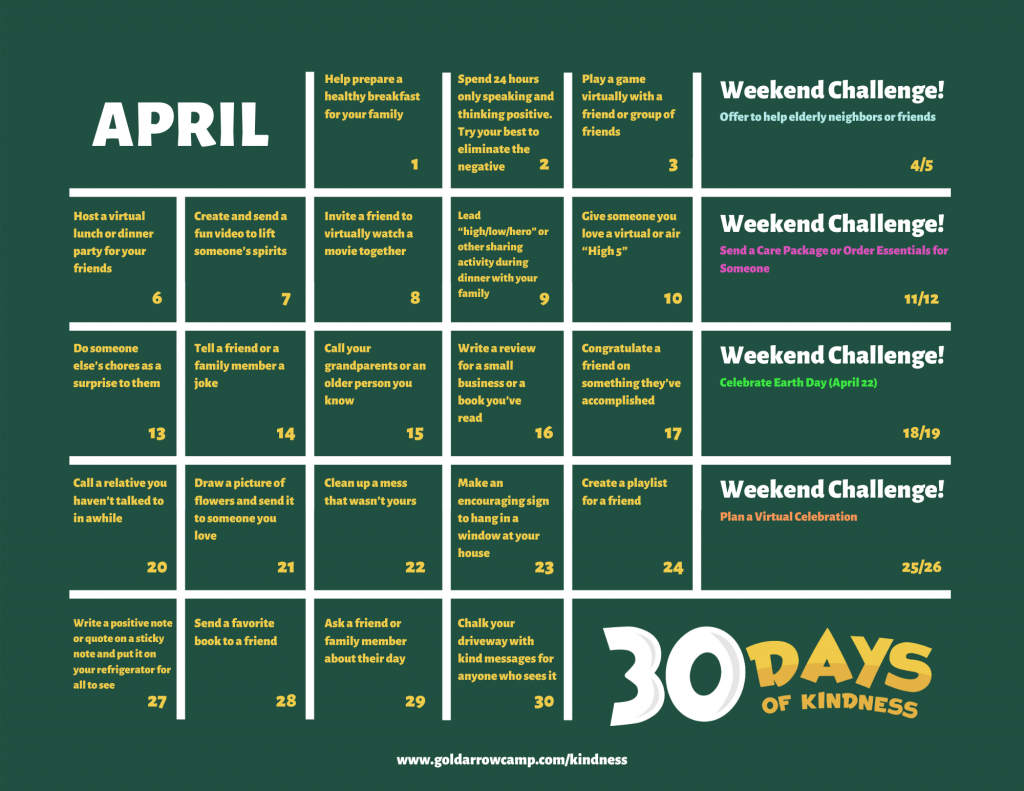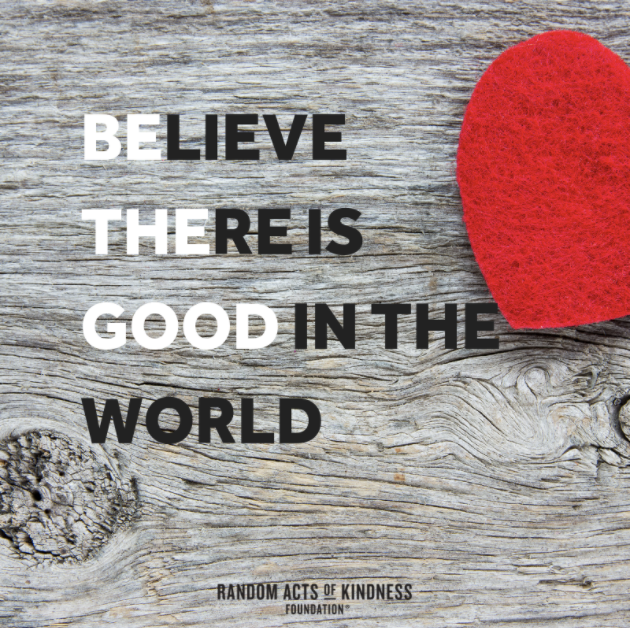BE YOU: Appreciate, Don’t Compare
BE YOU Week 4: Appreciate, Don’t Compare
Comparison is the thief of joy.
– Theodore Roosevelt
We are so excited to have Chelster join Sunshine this week for our #GACbeyou podcast. This week, we are talking about focusing on the qualities we really like in ourselves and trying to refrain from comparing ourselves to others. It’s our human tendency to see others and immediately compare ourselves to them. We tend to want to be like them and often lose sight of all the wonderful things we bring to the table. Instead of comparing ourselves to others, we can be happy that they are the way they are and appreciate them for that!
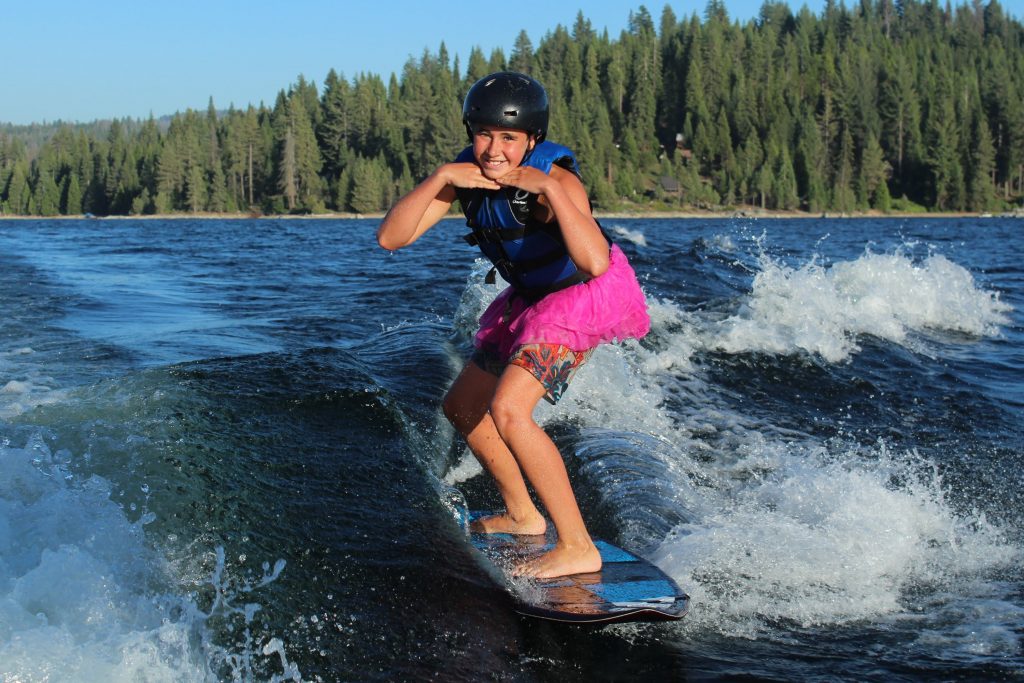
Life is like a team. We all play different parts and bring different skills to the team. It’s important to remember that the team will be at its best when everyone focuses on the skills that they are there to perform.
Instead of comparing, we should appreciate each other. We should be grateful for who they are and who we are. We can combine our strengths and talents with others’ to do bigger and better things. We are also more effective when we are appreciating and lifting others for who they are, instead of bringing them or ourselves down.
This week’s #GACbeyou challenge
Journal or share with someone else (can be a parent, sibling, or friend) your answer to this question:
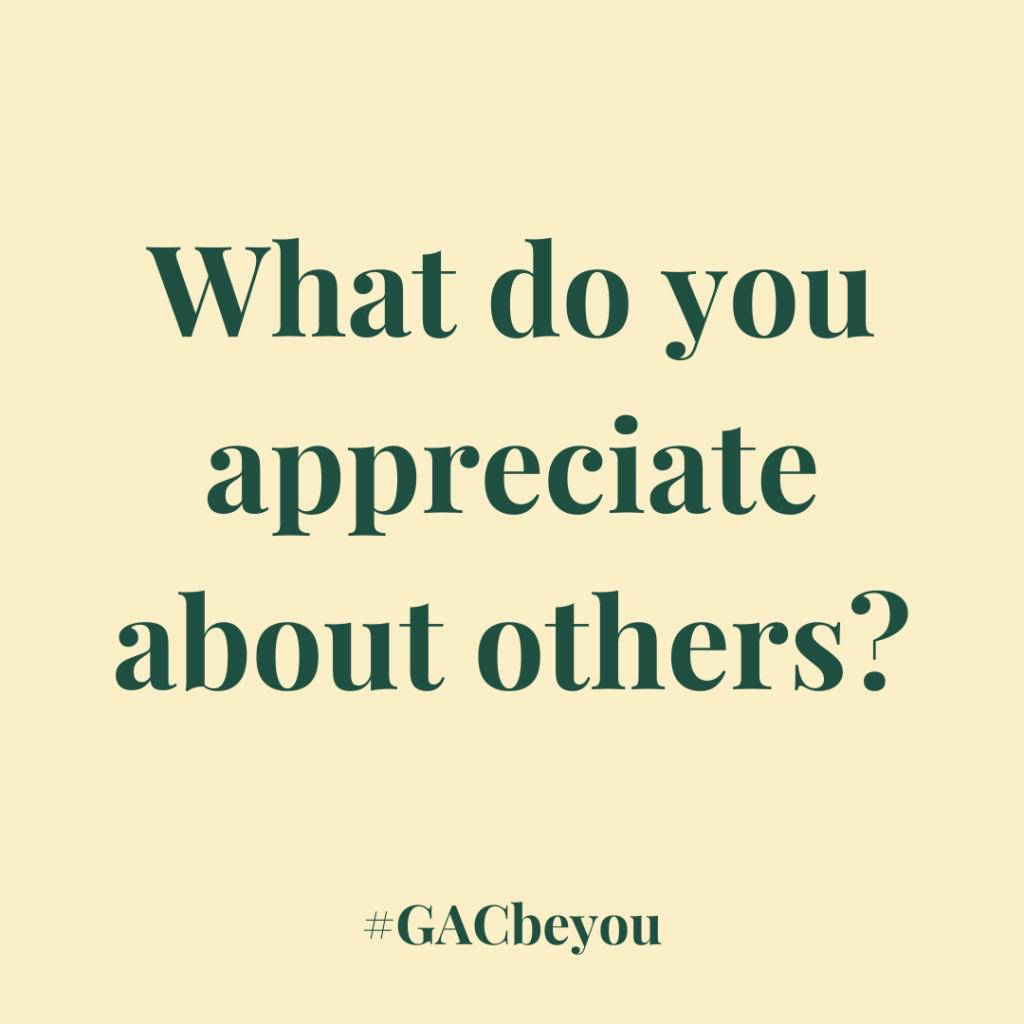
We all have so much to offer and so much to be grateful for. What are some things that you appreciate about others? Maybe you appreciate others’ kindness and their ability to keep secrets. Being able to recognize the things you appreciate about others, will help you appreciate things in yourself more easily.
Practicing daily gratitude is an easy way to appreciate who you are. Be grateful for being exactly who you are. If there is something you appreciate about yourself that you learned from someone else, maybe write them a letter telling them how they impacted your life. In the words of Anthem Lights, “‘Cause anybody can be a copy, and there will always be people talking. So face your fears and chase your dreams, and dance like no one’s watching.”
GACspiration
Want to be inspired? Print out this week’s GACspiration and post it on your bathroom door or mirror (just like at GAC)!
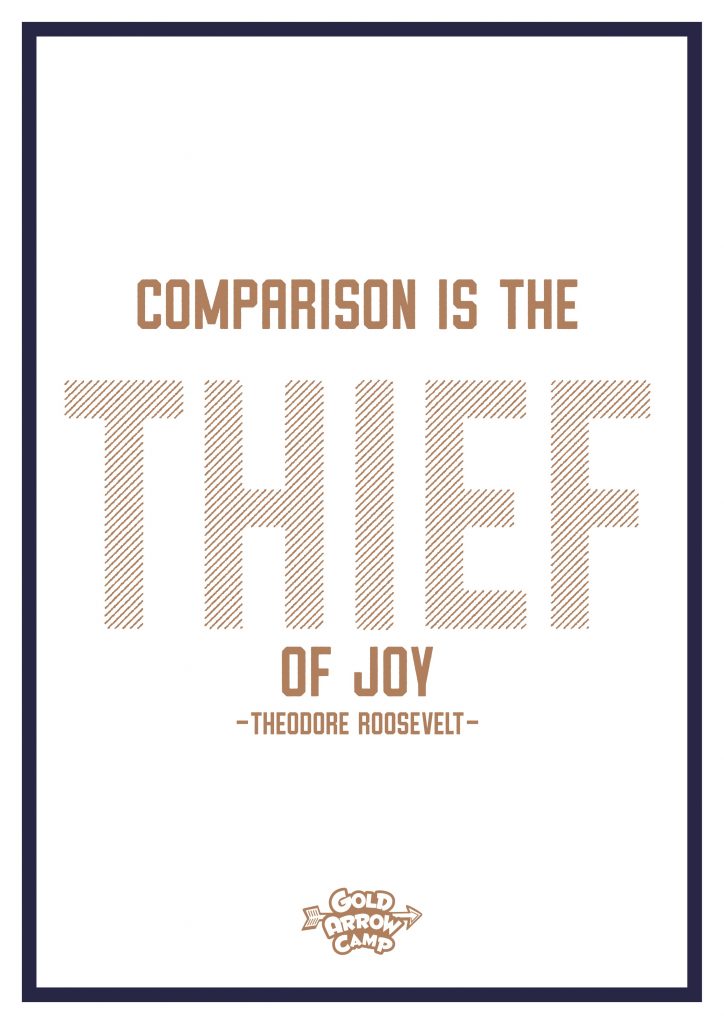
Activity Ideas
This week, we challenge you to learn more about yourself! Make a list of things you really like about yourself, including what makes you unique. Make another list of things others love about you! Ask your family members, friends, or even coaches. When you need a reminder of what makes you AWESOME, you will have these lists to look back on!
Resources
Comparison is the Thief of (Parenting) Joy
30 Things to Appreciate About You
How to Appreciate What You Have
Podcast: Play in new window | Download
Subscribe: Spotify | Email | RSS
BE YOU: What Stresses you Out? What Calms you Down?
BE YOU Week 3: What Stresses you Out? What Calms you Down?
“Do what you feel in your heart to be right, for you’ll be criticized anyway.”
– Eleanor Roosevelt
What are things that really stress you out or make you feel not so great? It is good to identify these things so that we can try to avoid them or work on strategies to manage them.
This week, we want to focus on identifying those stresses and identifying ways to calm our bodies and cope in those moments. Emotional regulation is an important life skill that should be talked about and practiced like any other skill. As we mature and gain life experience, we find new ways to calm our stresses and new ways to cope with our emotions. It’s important to learn how to process our emotions in a positive way.
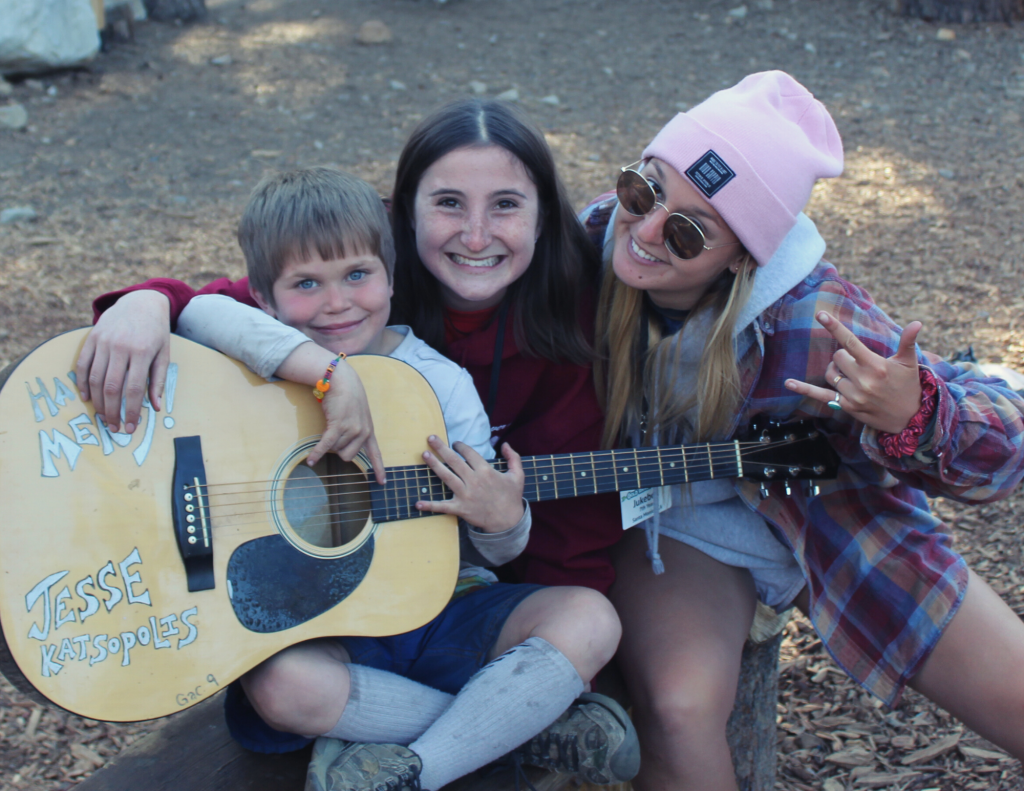
Our very own Audrey “Sunshine” Monke has created a helpful list of ten ways to teach kids to calm down. Although not all of these will work for each individual, we hope you will be able to gain some valuable tools from this list.
- Go to a “chill spot.”
- Designate a spot that is strictly for calming down. Maybe even have some calming activities stored in that area (coloring supplies, books, etc).
- Go outside for a walk or run.
- This can be a group activity or solo, but try to include some quiet reflective time.
- Take some deep breaths.
- Focus on deeper, slower breaths rather than shallower, faster breaths.
- Count to 10 (or 100).
- Count in your head while focusing on your breathing before responding to a situation.
- Listen to some soothing music.
- Make a playlist of happy songs, not angry or aggressive songs.
- Think of something you’re grateful for.
- Jot down something your grateful for when you are feeling down. Use pen and paper or even type it in your phone so that you can revert back to it at a later time.
- Look at a funny meme or video.
- A good belly laugh is good for the soul. Look up your favorite memes or even videos on your phone.
- Hug.
- Hug a loved one. While you are hugging, focus on your breathing. It will calm both parties.
- Loosen up.
- Focus on breathing and counting while stretching or doing your favorite yoga poses.
- Sit quietly and have a drink of water, cup of tea, or piece of fruit.
- You could even include this in the “chill spot”.
Practice some of these techniques the next time you need to calm down and figure out which ones work best for you!
This Week’s #GACbeyou Challenge
Journal or share with someone else (can be a parent, sibling, or friend) your answer to this question:
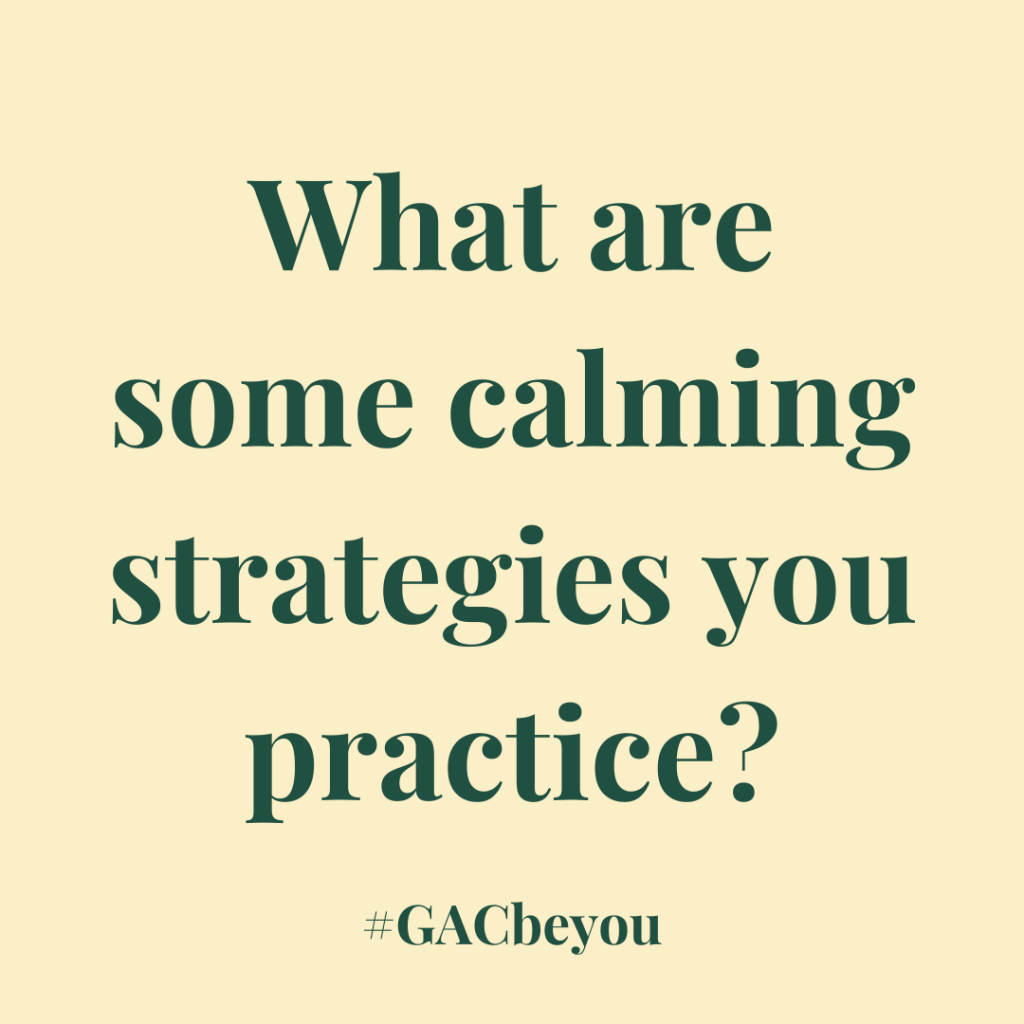
When have you felt your worst over the past few weeks, or even months? Maybe you felt frustrated, angry, or sad in certain situations. It’s important to identify these things within ourselves, just like we identify all the things or times that get us excited or happy!
What works best for you to help yourself feel better when you are stressed out? There are many different ways to calm down and feel better in a stressful situation. Camp is a great place to destress and calm our bodies. Being in the outdoors and exercising (camp allows us to move our bodies in so many different ways) are among the many ways to help ourselves unwind from our stresses.
Do more of what makes you feel great! Think back to last week’s post and what puts you into “flow.” The times you are in “flow” are usually times when you are doing something that is calming for you and that allows you to put a lot of energy into something you enjoy. The focus that you put into your “flow” activities are sure to be calming and put you in a happy mood!
GACspiration
Want to be inspired? Print out this week’s GACspiration and post it on your bathroom door or mirror (just like at GAC)!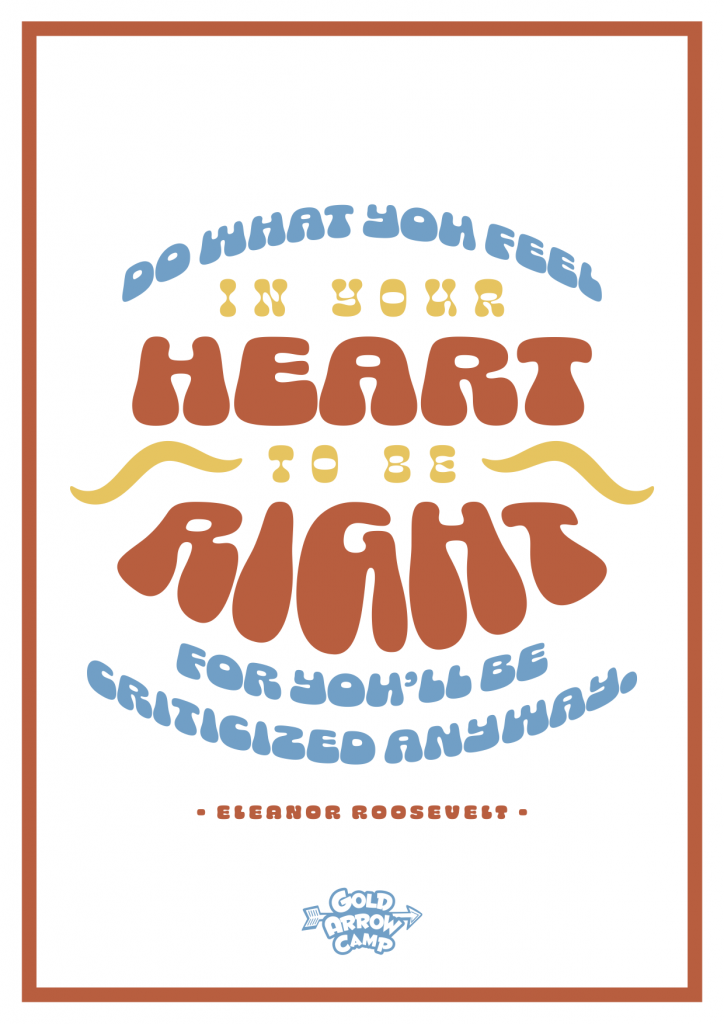
Activity Ideas
Make a chart of things that commonly stress you out or put you in a bad mood. Beside each one, write a calming strategy that might work to calm you down during one of those situations. When you are having a bad day or moment, go to your list and see which strategy you could try out! If it works, put a star next to it so you know that you can do that one again. If it doesn’t really work for you, that’s okay! Try another one until you find a few that you know you can count on!
Resources
10 Ways to Teach Kids to Calm Down
Podcast: Play in new window | Download
Subscribe: Spotify | Email | RSS
Be You: Find Your “Flow”
BE YOU Week 2: Find Your “Flow”
“If you have good thoughts, they will shine out of your face like sunbeams and you will always look lovely.”
– Roald Dahl
This week for our BE YOU theme, we’re focusing on finding activities that get you into a state of “flow.”
Flow is a term coined by psychologist Mihaly Csikzentmihalyi (pronounced “cheeks sent me high”) that refers to a state of optimal experience and involvement in an activity during which we are performing at our best.
Watch Dr. Csikszentmihalyi talk about flow in his TED Talk, “Flow, the Secret to Happiness.”
When we’re in “flow,” we are doing something we really, really enjoy. We can’t wait to do the activity again, and we feel a lot of positive emotions while participating in the activity. We can stick with it for hours without even noticing the time going by. In fact, when we’re in flow, it’s hard to stop whatever we’re doing. Flow is different from pleasure – simply doing things that are enjoyable like watching TV, scrolling on social media, or shopping. Instead, flow activities usually are demanding and take our full attention and concentration.
People achieve flow in all different ways, including while playing a musical instrument, playing a sport, writing, painting, attending a concert, bird watching, riding a horse, or running, to name just a few. Often we cannot relate to the passion others have for their personal “flow” activity, since their enthusiasm and passion seem inordinately high. For the lucky ones among us, we find flow in our daily work.
The younger you are, the more likely it is that you’ve been in flow today. Young children excel at getting into a state of flow, usually during unstructured play time. As they create their pretend worlds, “cook” in the sand box, build a fort, or swing high on a swing, they are joyful and time flies by for them. Young children are experts at happily living in the moment. As we get older, however, we need to be more aware of getting ourselves into that engaged, amazing state that we enjoyed when we were younger.
Here’s an official definition of flow:
Flow is the mental state of operation in which a person performing an activity is fully immersed in a feeling of energized focus, full involvement, and enjoyment in the process of the activity. In essence, flow is characterized by complete absorption in what one does.
And here are some ideas of possible flow activities from Deann Ware, Ph.d:
Physical activities such as sports, yoga, dance, and martial arts
Outdoor challenges such as hiking
Music–writing, playing, mixing
Art–painting, sculpture, mixed media, pottery
Photography
Woodworking
Do-It-Yourself projects, such as home improvement
Working with animals
Gardening
Cooking and baking
Software development/coding
Scrapbooking
Writing
Needlework–sewing, knitting, cross stitch
Horseback riding
What you do for work (hopefully!)
This week’s #GACbeyou challenge
What activities get you into flow? When have you been doing something that you are so engaged that you’ve completely lost track of time? That’s a fun thing to explore as we continue to delve into our “BE YOU” theme. Flow states are a great clue as we figure out who we are and what makes us our best self!
What are new activities you want to try this summer?
What makes your heart “sing?”
Sometimes, we need to explore different activities before we figure out which activities get us into that awesome state of flow. Don’t worry if you haven’t found that awesome, engaged state yet. Sometimes, it takes awhile to explore, and many adults haven’t even figured it out yet! So start now, while you have some free time, exploring different activities – creative, athletic, academic, etc. – and find your flow!
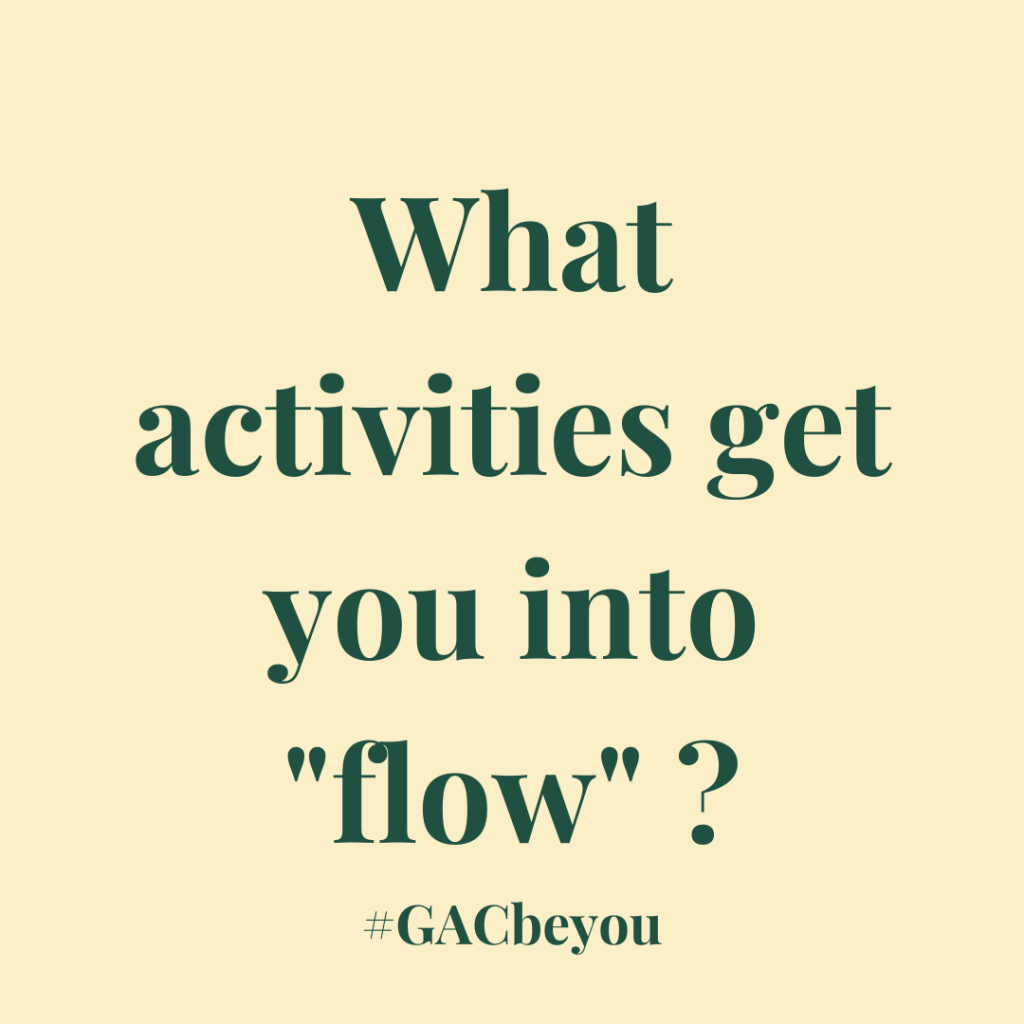
GACspiration
Want to be inspired? Print out this week’s GACspiration and post it on your bathroom door or mirror (just like at GAC)!

Activity Ideas
Make a list of different possible flow activities that you want to explore. Consider different hobbies, sports, and music you have some interest in learning more about.
Try one new activity from the list you made.
More Flow activity ideas:
positivepsychology.com
dailyshoring.com
From Designing Your Life:
Energy Engagement Worksheet
Good Time Journal Activity Log
Resources
Read more about flow in this post on Sunshine Parenting.
Podcast: Play in new window | Download
Subscribe: Spotify | Email | RSS
Be You: You’re One of a Kind!
BE YOU Week 1: You’re One of a Kind!
“To be yourself in a world that is constantly trying to make you something else is the greatest accomplishment.”
― Ralph Waldo Emerson
Have you ever thought about how amazing it is that there is no one else who is exactly like you? You are unique, original, and one of a kind!
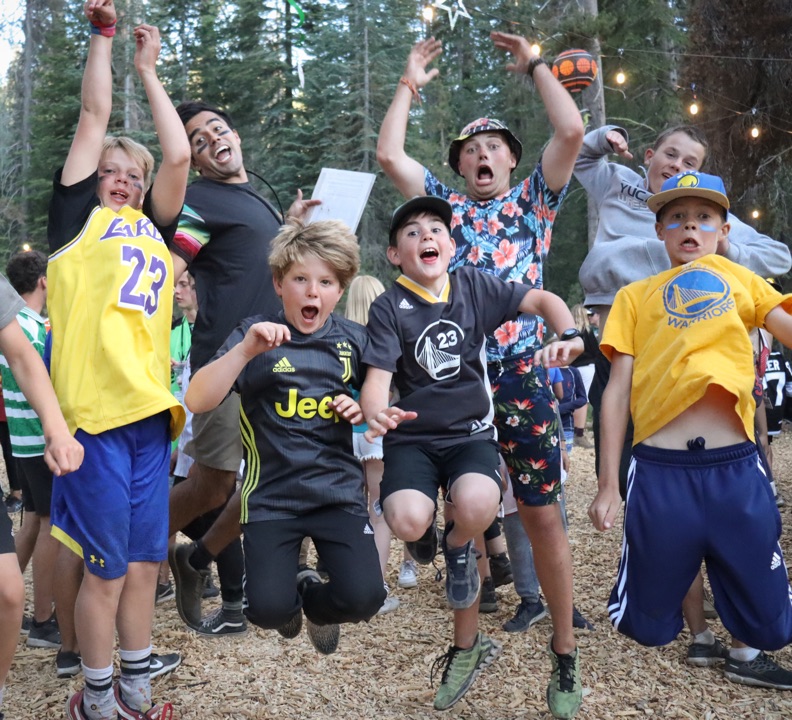
This week for our BE YOU theme, we’re focusing on what you like best about yourself. It may sound strange to think and talk about what you like about yourself. It may sound like bragging or being overconfident. But it’s really important that instead of always telling ourselves and thinking about our faults and what we don’t like about ourselves that we take time to think about what we do like.
Watch the challenge online: https://www.youtube.com/watch?v=Y8tPrYhEoHQ
This week’s #GACbeyou challenge
Journal or share with someone else (can be a parent, sibling, or friend) your answer to this question:
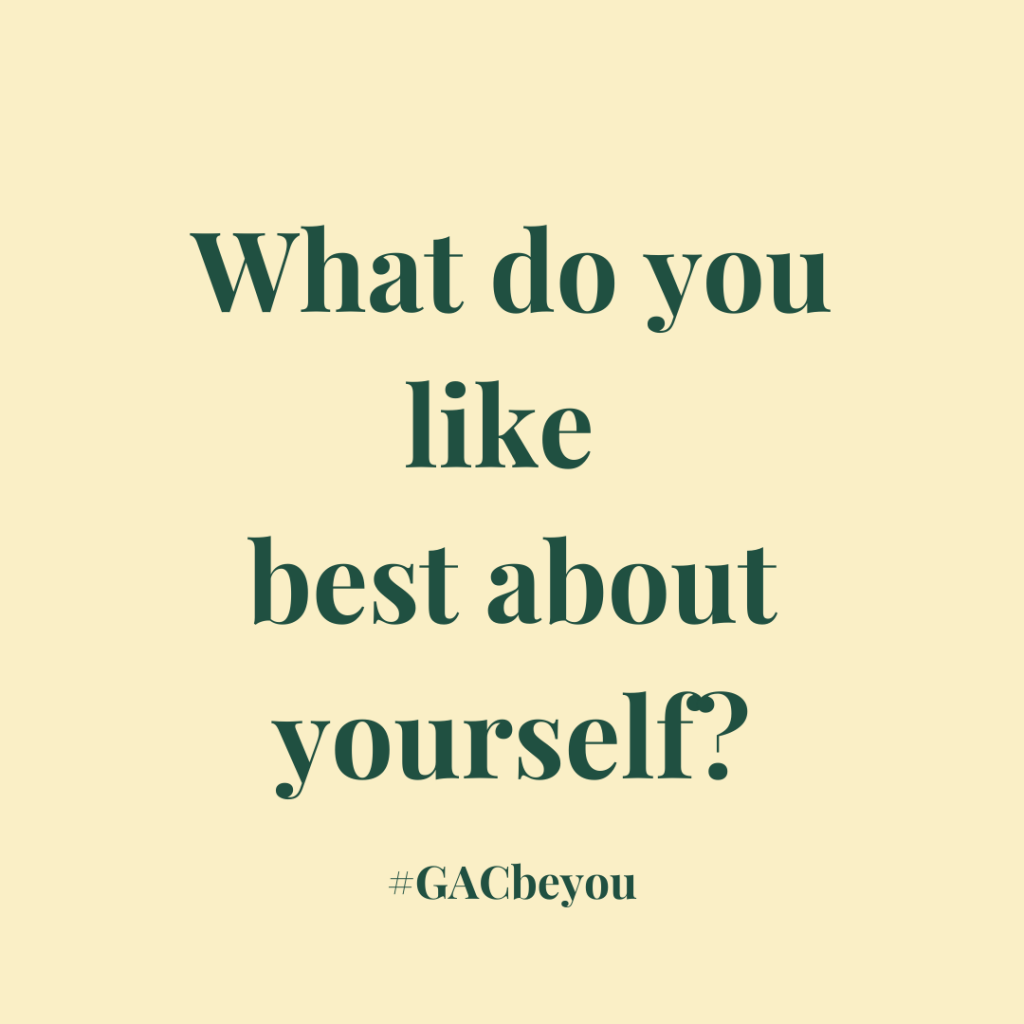
Focus on your the inner qualities — personality traits and talents — that you like best about yourself.
Here are some examples of personality or character traits that you might especially like about yourself:
Kindness – You think about others and do acts of kindness.
Enthusiasm – You get super excited about things – and get other people excited, too.
Grit – You stick with things even when it’s hard.
Sense of Humor – You make people laugh.
Gratitude – You thank others and think about things you’re grateful for.
Honesty – You tell the truth, even when it’s hard or you get in trouble for telling the truth.
Brave – You courageously speak what you believe, even when your opinion is unpopular.
Compassionate – You think about others, feel pain when others are hurt, and take action to help.
Leader – You influence others to act in a positive way.
Loyal – You stick by the side of your family and friends and stay loyal even when people are going through hard times.
These are just a few examples of character traits you might really like about yourself. There are many more!
Here are a few talents you might really like about yourself. How would you finish this phrase: “Something I like about myself is that I’m great at ……”
Music (playing an instrument, singing)
Sports (playing soccer, running, ping pong)
English, science, history, or another subject
Painting, photography, drawing, sewing, making friendship bracelets.
Writing
Reading
Doing magic tricks, riding a unicycle, playing chess, etc.
There are so many different talents and skills each person has. What is something you are good at that you really like about yourself?
GACspiration
Want to be inspired? Print out this week’s GACspiration and post it on your bathroom door or mirror (just like at GAC)!
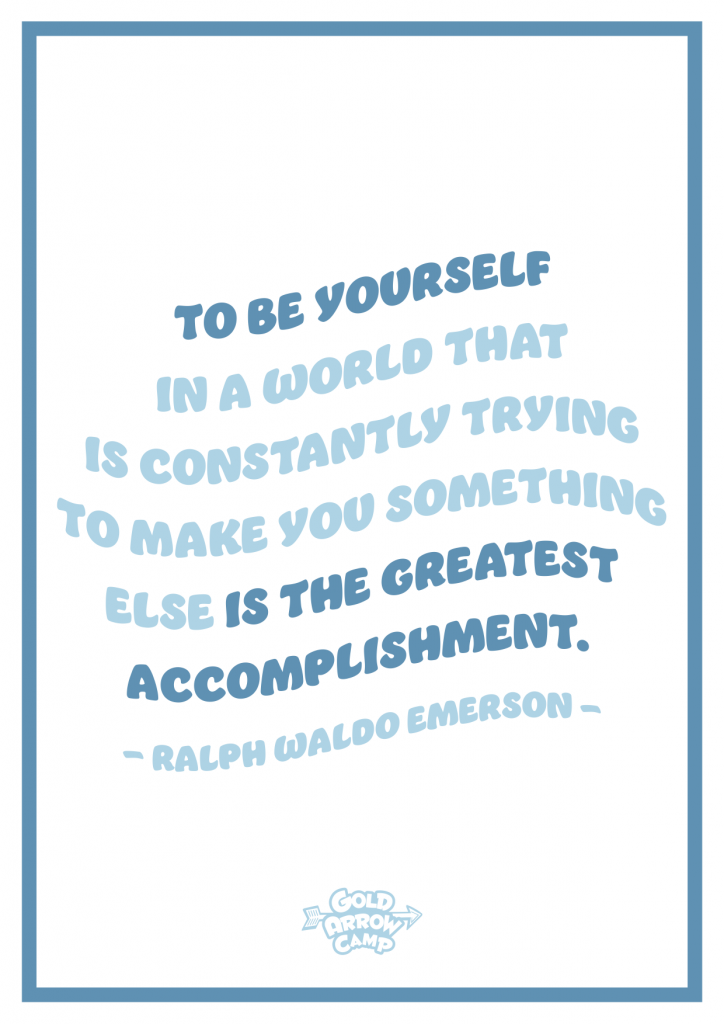
Activity Ideas
• Get together (in person or online) with your family or a group of friends. Give everyone a chance to share one thing they like about themselves.
• Create a longer list of 10 (or more) things you like about yourself. You could make a list of as many things you like about yourself as how old you are. So, if you’re 14, write 14 things you like about yourself.
• Share with one of your parents, siblings, or a friend something you like about them and ask them to share something they like about you. You’ll both feel happier after the conversation!
Resources
#GACkindness: 30 Days of Kindness
Will Kellogg on Growing Grit and the First Attempt In Learning
Sunshine Parenting Podcast Ep. 28: Focusing on Our Kids’ Strengths
Podcast: Play in new window | Download
Subscribe: Spotify | Email | RSS
Be You!
“To be yourself in a world that is constantly trying to make you something else is the greatest accomplishment.”
― Ralph Waldo Emerson
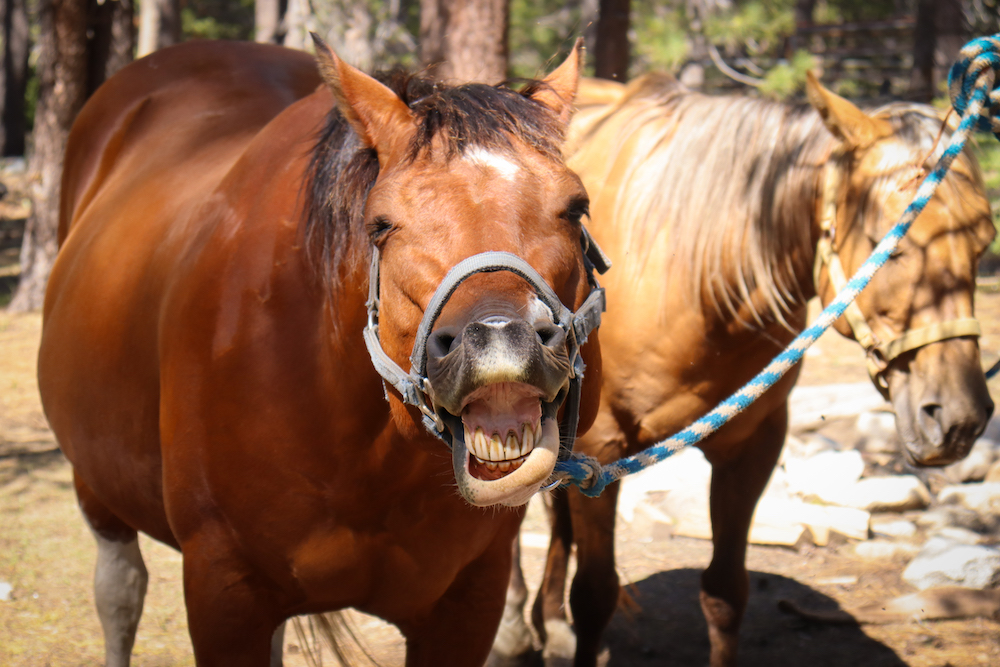
To keep up with our BE YOU theme this summer:
Check your inbox on Monday for our BE YOU weekly email.
Follow GAC on Instagram
(Use hashtag #GACbeyou.)
Be You!
It sounds like such a simple task. After all, aren’t we all just automatically ourselves?
But it’s actually not as simple as it seems. We all feel pressure to fulfill expectations, fit in, go with the flow, look and act a certain way, and do what everyone else is doing.
Sometimes all of that pressure can lead to feelings that we’re not enough just the way we are. Confidence can be eroded when we feel like we’re falling short.
At GAC we believe in encouraging campers and staff to accept and celebrate our own and others’ strengths and unique traits. “Being You” is one of our core values, and many kids tell us that they feel freer to be themselves at camp than in other places. Campers and staff often report that they feel like they can “be themselves” at camp.
Each year, we pick a theme to help guide us through camp. This summer, even though we won’t be together at camp, we’ll be exploring and sharing about what it means to be our true, authentic selves.
We’ll encourage campers to explore what it means to be their “best selves” with questions like these:
- What do I like best about myself?
- What do I really enjoy doing?
- What are my goals?
- What do I dream of doing?
- What are the personality quirks and strengths that make me special?
- How can I be kinder to myself with my “self talk”?
- How can I encourage and support my friends in being their authentic selves?
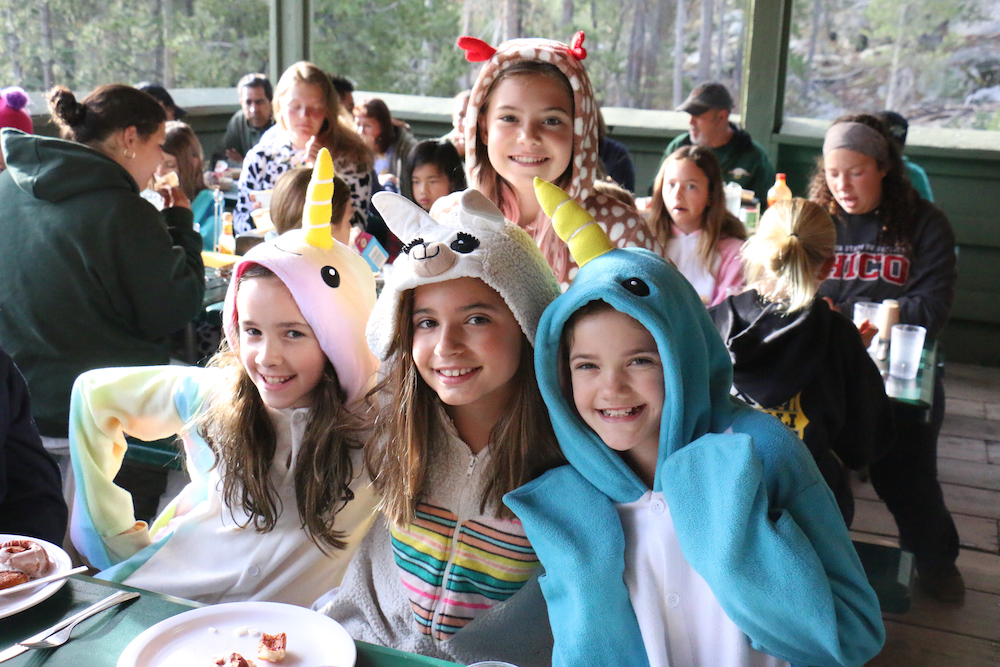
When we spend time talking and thinking about the interests, traits, and strengths that make us who we are, we gain self-awareness, which is an important aspect of emotional intelligence and one that helps us be a better friend to others. Self-awareness also builds our confidence and ability to understand that we don’t need to be an expert or be perfect at everything. No one is!
When we support our friends by pointing out their strengths and the unique, cool things we like about them, we strengthen our friendships, too.
This summer , not only will we be learning about how to be our best selves, we’ll be learning about how to help our friends be their best selves, too!
Our “Be You” theme for 2020 gives us the opportunity to take advantage of our extra time for reflection (because we’re all stuck at home) and reconnect with what makes us awesome just the way we are.
Check out Monkey and Soy’s formal announcement of our theme (back in January, before we knew we’d be stuck at home this summer), complete with many “b” based puns, enjoy this video:
My School In Motion!
My School In Motion, founded by camp parent Apryl Krakovsky, is a program designed to get school communities moving and learning every day. Their videos are fun exercise routines for kids and adults that incorporate positive messaging about health, wellness, and nutrition.
“My School In Motion, Inc.’s mission is to provide all students, regardless of race or socioeconomic status, with an early positive physical activity experience, while at the same time educating them in the areas of nutrition, fitness and wellness, and empowering them to make smart choices today and in the future. We want to ensure that students have the best start to every school day and set them on a path for a lifetime of health, productivity and happiness.”
We are lucky enough to be able to share some of My School In Motion’s exercise routines to you in your home! Do these routines with your family and enjoy the fun you have with them!
Movement Routines: Good Life, Boom Boom Pow, I Like to Move It, PB & Jelly Time
Movement Routines: PB & Jelly Time, Who Let the Dogs Out, Cupid Shuffle
Movement Routines: Popcorn, U Can’t Touch This, Jack Attack, Good Life
Movement Routines: Set A Goal – One Step at a Time Warm-Up, Waka Waka, I Like to Move It, Cupid Shuffle, Yoga/Focused Breathing Cool Down
Movement Routines: Sunburst, Just Say Yes, 5678, Who Let the Dogs Out, Agadoo
Movement Routines: Dynamite, 5678, Addams Family, Macarena, Agadoo, Focused Breathing/Balloon
Movement Routines: Cardio Routine 1, PB&Jelly Time, Waka Waka, Just Say Yes, Good Morning Sky
Talking With Kids About Camp Being Canceled
For some of our campers and staff – especially for those who have been counting down the days to their session and anticipating getting back to their favorite place on earth – the cancellation of GAC 2020 is yet another loss in a year that has already been full of loss. This pandemic is leaving no person or place untouched.
We are aware that the cancellation of camp makes an already difficult time even harder, and we had really hoped not to have to cancel all of our summer sessions. We know how beneficial camp would be for our community this summer.
We are committed to providing resources and support to our camp families during this difficult time. We will continue to stay connected to our camp community, and we will share resources with you. We will also encourage our campers and staff to continue practicing GAC’s values.
Specifically, we will be encouraging our camp families to:
• Unplug and connect face-to-face with family members and others you are sheltering with.
• Get outside and experience the awe of nature.
• Practice kindness.
• Practice positivity and encourage others.
GALA (Gold Arrow Leadership Academy)
For those families who are interested in having some GAC connection and growth this summer, we are offering a four-week virtual camp program with consistent groups and counselors. The groups will meet three times per week for four weeks.
For more information, visit:
GALAMS (6-8th grades)
GALA (9-12th grades)
Resources for Parents
Tina Payne Bryson, Ph.D. has many helpful videos and resources for helping us and our children through this pandemic. The video below is particularly helpful as we help our kids process their disappointment over cancelled summer plans.
Sunshine talked with Tina on her podcast several weeks ago for this episode:
Ep. 136: Showing Up for our Kids during COVID-19
As you communicate with your kids about the cancellation of camp, expect that your kids may be upset. Psychologist and educator Dr. Christopher Thurber recommends that you don’t try to give advice or problem solve right away. For many kids, there isn’t a substitute for camp. Dr. Thurber recommends we let our kids sit with their grief for as long as they need to and we give them the space to talk about their feelings.
Grieving the Loss of Summer Camp: Concepts for adults to understand before talking with kids
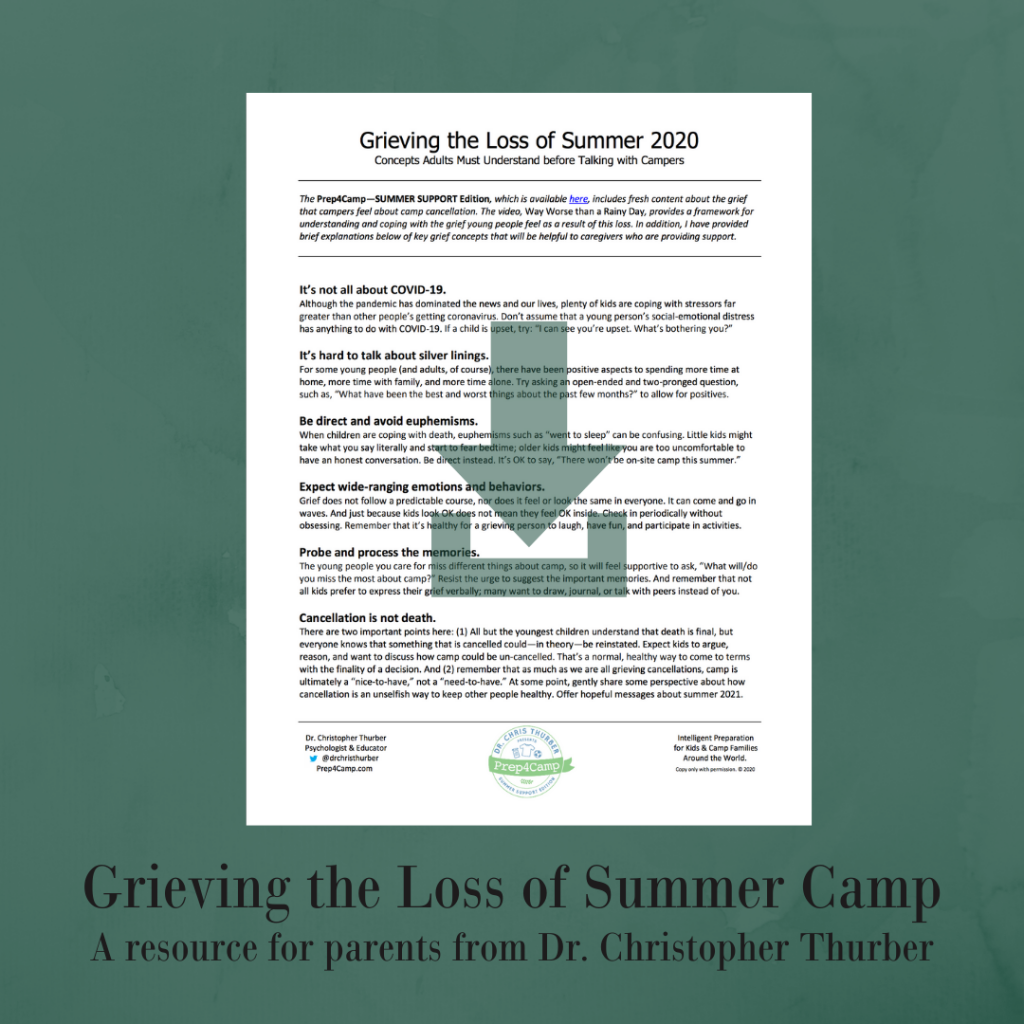
Sunshine talks about validating kids’ feelings in this video:
Maintain the foundations of wellness & promote kids’ mental health
Dr. Thurber also recommends we make sure our kids are eating and sleeping well and getting exercise.
For more information on the “Triumvirate of Good Health,” listen to the interview Sunshine did with Dr. Jess Shatkin, a board-certified child, adolescent, and adult psychiatrist who leads the educational efforts of the NYU Department of Child and Adolescent Psychiatry, about promoting our kids’ mental health.
Listen to Sunshine Parenting Ep. 124: Promoting Mental Health with Dr. Jess Shatkin
Dr. Thurber has some new resources for parents to help debrief with kids about their grief about the cancellation of camp and other important events this year. You can download this PDF with his talking points, and you might want to also watch Dr. Thurber’s 9-minute video “Way Worse Than a Rainy Day” with your camper to help you with your communication. Activate your subscription for Dr. Thurber’s video and other resources at prep4camp.com. Use GAC coupon code GOLDARWP4C at check out (we have pre-paid for our families to access these resources). Instructions are included below.
Step 1: Click here to access the “Way Worse than a Rainy Day” video by Dr. Chris Thurber
Step 2: Click “Get Access Now”
Step 3: Select “Prep4Camp” under “Choose offer”, then click “Continue” (no payment is required!)
Step 4: Fill in your information to “Create an account”
Step 5: On the right side of your screen enter GOLDARWP4C for the “Discount code” and click “Apply”
Step 6: Click “Complete” in the center of your screen and wait 5 seconds for the site to redirect you to the “Way Worse than a Rainy Day” video
Talking Points with Children & Teens
It’s not all about COVID-19.
Although the pandemic has dominated the news and our lives, plenty of kids are coping with stressors far
greater than other people’s getting coronavirus. Don’t assume that a young person’s social-emotional distress has anything to do with COVID-19. If a child is upset, try: “I can see you’re upset. What’s bothering you?”
It’s hard to talk about silver linings.
For some young people (and adults, of course), there have been positive aspects to spending more time at
home, more time with family, and more time alone. Try asking an open-ended and two-pronged question,
such as, “What have been the best and worst things about the past few months?” to allow for positives.
Be direct and avoid euphemisms.
When children are coping with death, euphemisms such as “went to sleep” can be confusing. Little kids might take what you say literally and start to fear bedtime; older kids might feel like you are too uncomfortable to have an honest conversation. Be direct instead. It’s OK to say, “There won’t be on-site camp this summer.”
Expect wide-ranging emotions and behaviors.
Grief does not follow a predictable course, nor does it feel or look the same in everyone. It can come and go in waves. And just because kids look OK does not mean they feel OK inside. Check in periodically without obsessing. Remember that it’s healthy for a grieving person to laugh, have fun, and participate in activities.
Probe and process the memories.
The young people you care for miss different things about camp, so it will feel supportive to ask, “What will/do you miss the most about camp?” Resist the urge to suggest the important memories. And remember that not all kids prefer to express their grief verbally; many want to draw, journal, or talk with peers instead of you.
Cancellation is not death.
There are two important points here:
(1) All but the youngest children understand that death is final, but everyone knows that something that is cancelled could—in theory—be reinstated. Expect kids to argue, reason, and want to discuss how camp could be un-canceled. That’s a normal, healthy way to come to terms with the finality of a decision.
(2) Remember that as much as we are all grieving cancellations, camp is ultimately a “nice-to-have,” not a “need-to-have.” At some point, gently share some perspective about how cancellation is an unselfish way to keep other people healthy. Offer hopeful messages about summer 2021.
Psychologist & Educator for Kids & Camp Families
@drchristhurber Around the World.
Prep4Camp.com Copy only with permission. © 2020
What Campers are Grieving
According to Dr. Thurber, there are some common things kids might be grieving, including:
• The loss of the face-to-face communication, interaction with people, the opportunity to form lifelong friendships, and the chance to reconnect with their best friends in the whole world.
• The loss of the “camp vibe,” the culture of positivity and fun and the kind way people treat each other.
• The loss of the physical contact that is a big part of camp – the high fives, hugs, and fist bumps that fill our camp days.
• The loss of some of the specific, fun activities campers only have the chance to do at camp.
• The loss of the beauty of the camp setting and the positive memories that being at camp evokes.
• The loss of the opportunity to relax, have fun being goofy, and be free from the stresses of school, competitive sports, social media, etc.
We hope your camper will be back with us in 2021, when we will all be even more grateful for our time together at camp. In the meantime, we hope you’ll stay connected with us and participate in our online events this summer and live events (GAC Runners events, GAC Parties, etc.) next year.
Whadda In Place
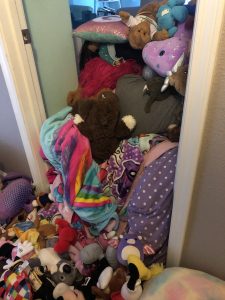
“Look, Mom! We made a fort!”
“Look, Mom! We made a fort!”
I hope the wince on my face looked more like a smile as I surveyed the efforts my children, ages 4 and 7, had made to create a fort using every pillow, blanket, and stuffed animal they could find. I am glad the girls had some fun (and even more fun learning how to fold the blankets as we put them all away), but this scene is representative of the chaos that ensues after days on end of being stuck at home and having to juggle our work schedules while supervising playtime.
I can’t imagine how any parent could feel successful in every realm of life right now. Between parenting, e-learning, work commitments, household duties, cooking, shopping, and self-care, everyone is stretched and scrambling to find balance in our “new normal.”
For the past three weeks, we have been working with some of our awesome GAC counselors to put together virtual events to help provide connection and fun for our campers and camp families in an otherwise challenging time. We hope you have been able to attend some of our live events on Zoom or on Facebook or have viewed the recorded events on YouTube.
Our Afternoon Assemblies have been a fun time for campers and counselors to play games, sing songs, hear the Joke-of-the-Day, and reminisce about the fun we have at Morning Assembly each day at camp.
Our Virtual Campfires have served as a great way for campers to connect to similar-age peers in small groups. The group leaders facilitate discussions, play games, and help campers meet and talk with each other. We have been very happy with the campers’ ability to engage with each other, listen patiently, and share openly in their groups.
Big Virtual Campfire was a big, virtual success, with many campers and counselors submitting acts that showcased a variety of talents. We’re looking forward to our next Big Virtual Campfire next week!
For the next two weeks, we are launching a series of virtual events we’re calling, “Whadda in Place: Bringing a Little Summer into Spring!” Our virtual events have some new and exciting twists, including special events at the beginning of each Virtual Campfire, a virtual camp dance for the whole family, and our next Big Virtual Campfire to conclude the two weeks of fun.
Here’s the schedule of the upcoming virtual events:
This Week:
TODAY, Monday April 6, 4pm PT: Afternoon Assembly on Zoom or Facebook Live.
Tuesday, April 7 @ 4pm PT: Bingo Fun & Virtual Campfire (email us for login details)
Thursday, April 9 @ 4pm PT: Magic with Dan Chan the Magic Man & Virtual Campfire! Bring a quarter, 2 rubber bands, and a deck of cards to join in on the magic! (email us for login details)
Next Week:
Monday, April 13 @ 4pm PT: Afternoon Assembly on Zoom or Facebook Live.
Tuesday, April 14 @ 4pm PT: Trivia Game & Virtual Campfire (email us for login details)
Thursday, April 16 @ 4pm PT: Jersday Thursday Sports Dance! Dress in your sports gear as we host a virtual dance party–just like a camp dance! (email us for login details)
Friday, April 17 @ 4pm: Big Campfire (Send your acts of kindness or theme day activity photos & videos by Wednesday, April 15, for the slideshow!) Watch the fun live on Zoom or Facebook Live, or watch it with your popcorn and Red Vines on YouTube when you want.
Family Fun Days!
We love having theme days at camp, and we’ve put together some great theme days for you to do at home with your family. We have curated activities, recipes, crafts, and songs that correspond with the themes and hopefully take some of the work out of creating family fun at your house. Take pictures or videos of your family doing these activities and email them to mail@goldarrowcamp.com or post them on social media with #whaddainplace. We will use the photos for a slideshow at our next Big Virtual Campfire to show our GAC families having some fun together!
Each theme day provides several suggestions for family fun, and you can pick and choose the activities, recipes, and crafts that work best for your family. Even if you only pick one or two activities from each theme day, we hope you will find these to be helpful and fun resources.
Click each graphic below for the theme day information and a materials checklist:



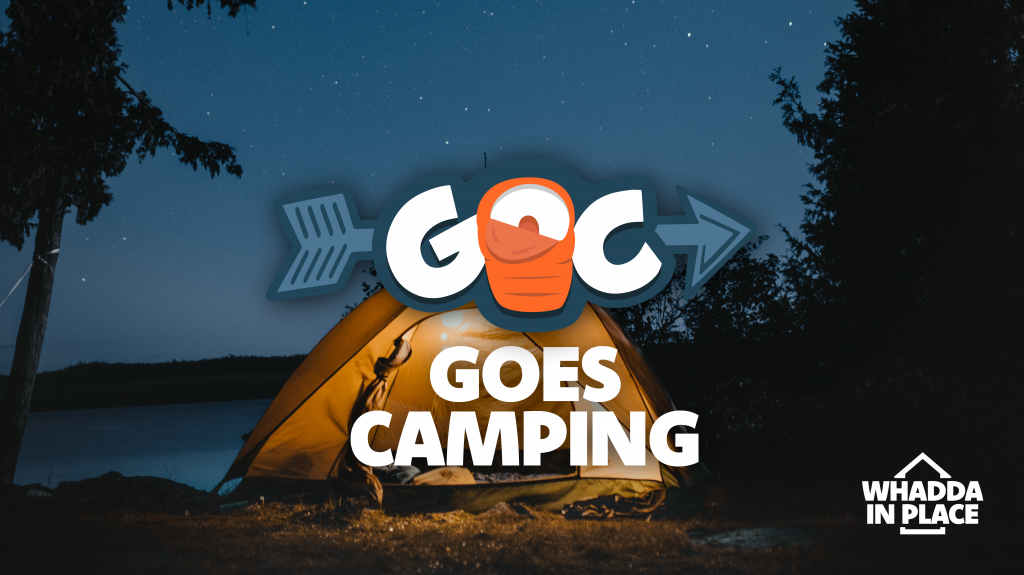
We would love to hear your feedback about these virtual events and can’t wait to see pictures of your family as you “Whadda in Place!” You can email us your photos or tag us on social media (@goldarrowcamp) and use the hashtag #whaddainplace. We can’t wait to see what you do!
12 Stay at Home Tips
Want some stay-at-home tips for your family?
We’re all spending a lot of time at home these days during COVID-19, and it’s good for our mental and emotional health to mix things up once in a while.
Here’s a recap of the ideas Sunshine’s been sharing at our virtual Afternoon Assemblies!
#1 Participate in 30 Days of Kindness
Focus on others by doing small (and large) acts of kindness, and it will make you feel better, too!
#2 Mail a hand-written letter or note
Everyone LOVES getting a real letter in the mail. Collect the random cards and stationery from around your house (or in your camp supplies). Next, write a postcard, note, or letter and mail it to a friend, relative, or even a stranger (see ideas in 30 Days of Kindness)! You might even get one back, which is super fun!
Many kids do not know how to address a letter. Take time to learn, and you’ll be all set for writing letters from camp!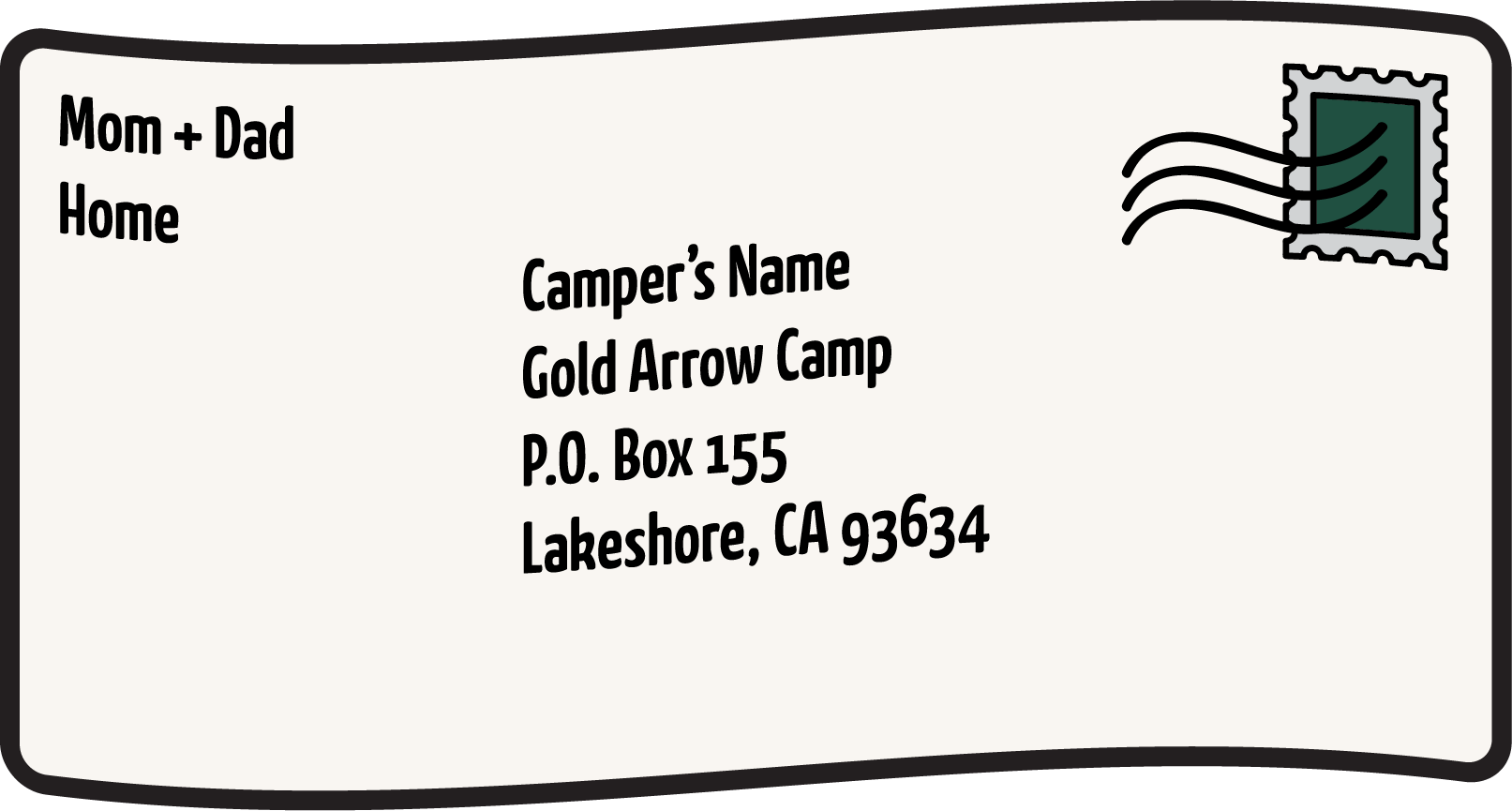
#3 Learn to cook something new
What’s a favorite recipe you want to learn how to cook? Take this time at home to learn how to cook something (or several things)! Cook the recipe three times, each time doing the cooking more independently.
Step 1 Cook the recipe with your parent.
Step 2 Cook the recipe with your parent supervising, but you doing all the cooking.
Step 3 Cook the recipe on your own. Let your parent relax while you cook!
Here are a few moments of video of Sunshine supervising (Step 2 above) her 16-year-old making this POMEGRANATE HABANERO SHREDDED BEEF RECIPE:
Bonus: Send us your favorite recipe and/or create a video tutorial of how to make the recipe (see Joss’ below):
#4 Clean out your game/puzzle cabinet(s)
What’s even in there? Go through your games and puzzles. Find a favorite or two to get out to play as a family. For ones you no longer use because they are for younger kids , create a stack to donate to another family or neighbor. For ones with missing pieces, recycle, use for creating a craft, or put in the trash.
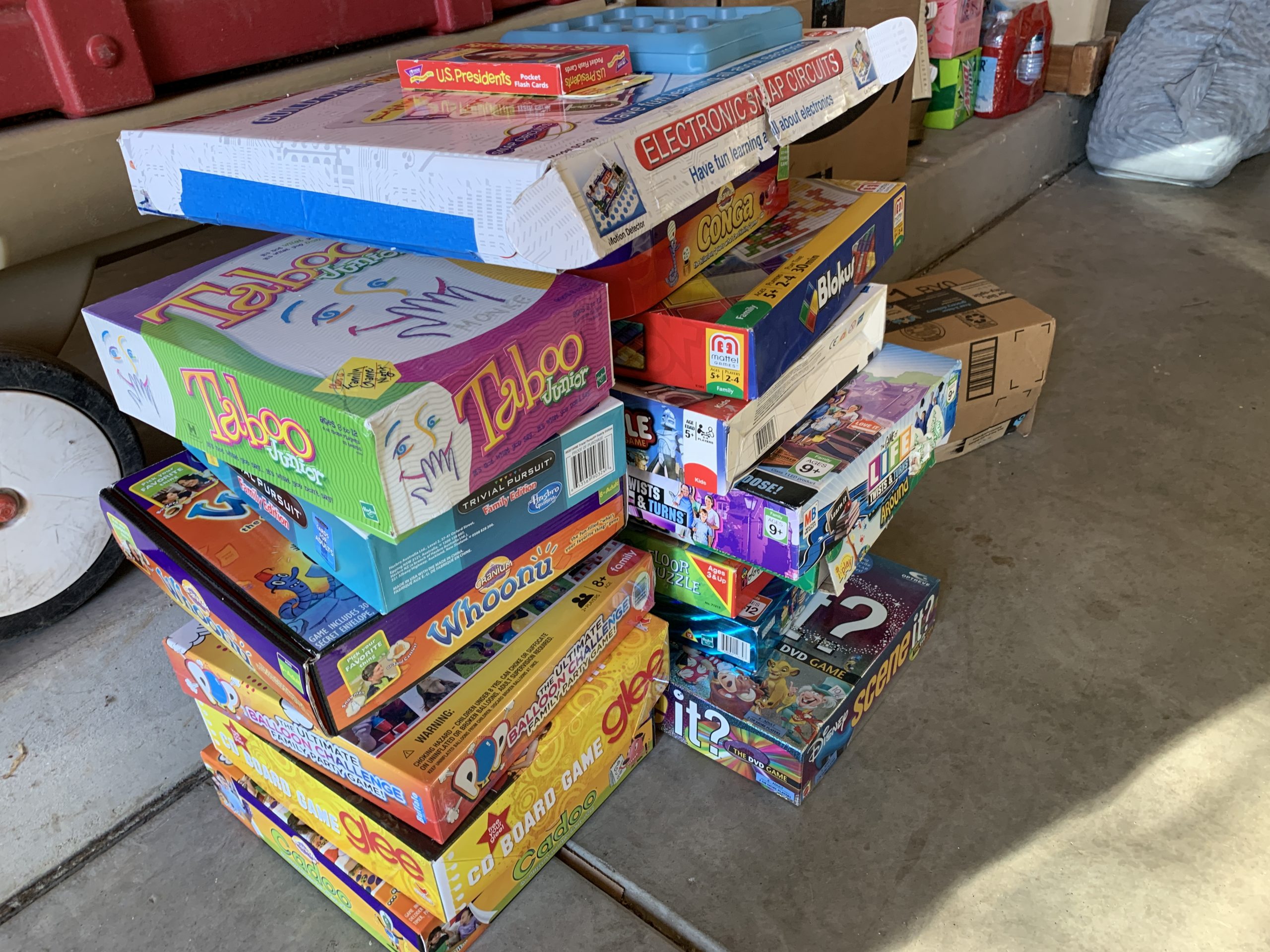
#5 Make a list of 10 things you’ve been wanting to do
With school now online and extracurricular activities, sports, and in-person social time with friends limited, we’ve got some extra time on our hands. This is – for many of us – a new situation. And it can feel uncomfortable having so much down time. Try writing a list of 10 things ranging from random “to dos” to things you’d like to learn. This can include books you’ve wanted to read, hobbies or crafts you’ve been interested in trying, a musical instrument you’d like to learn to play or practice playing more, learning sign language, or anything else that comes to mind for you! You can try to include things that include:
• Something physical (train for a 5K run, do a daily plank, try an online yoga class)
• Something creative (friendship bracelet, crochet, painting)
• Something social (call or write a letter to a friend)
• Things you haven’t had time for (a book you’ve wanted to read or movie you’ve wanted to watch)
Then, take the first step. Start reading the book or research how to do the hobby.
#6 Sort your books by color
Do you love books and reading? Take some time to organize your books. Create a beautiful shelf by organizing your books by color!
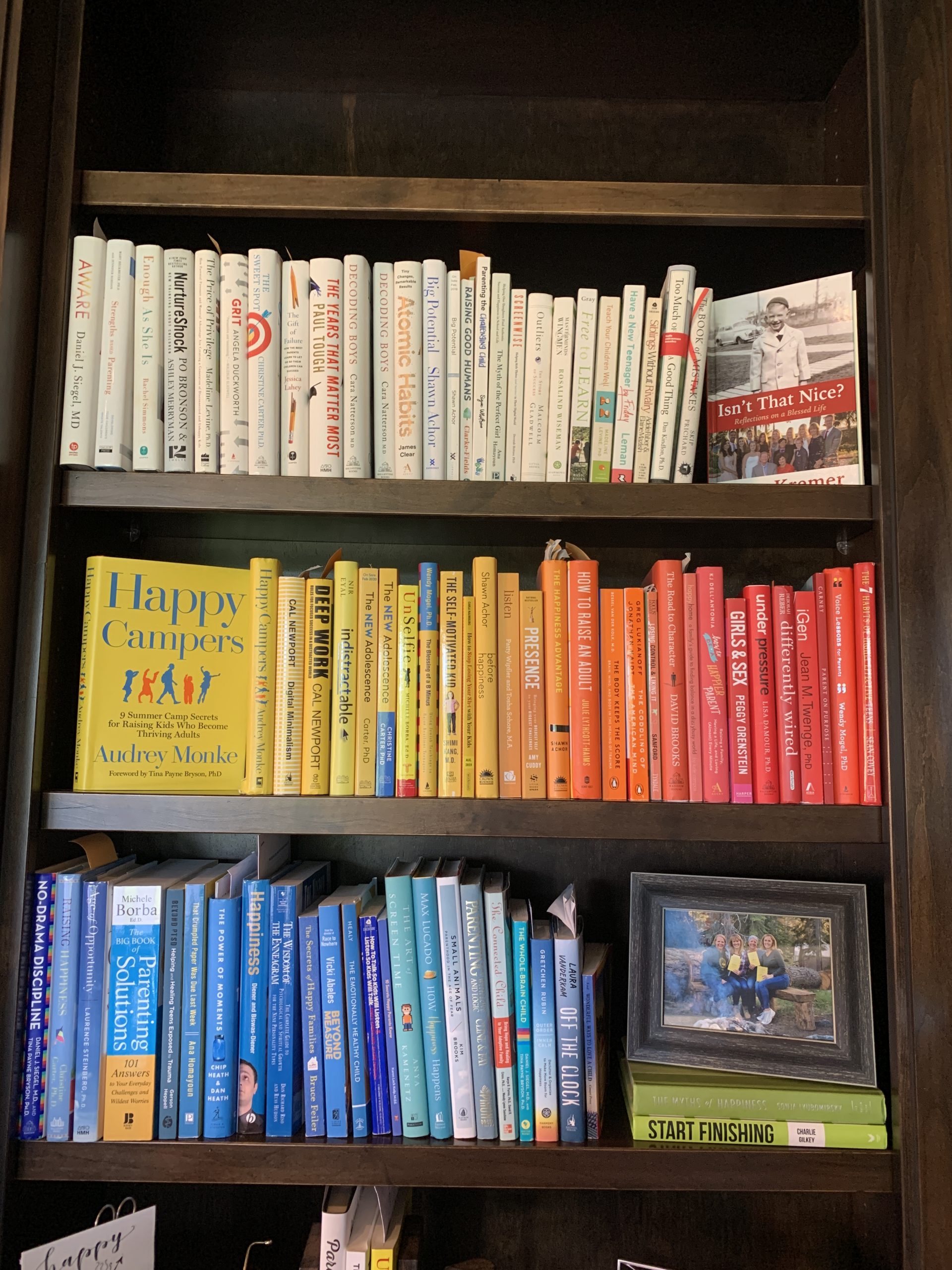
#7 Move some furniture (or create a little quiet space just for yourself)
To make your home feel a little different, move some furniture around a bit so that it feels “new.” Or, create a little space for yourself on a cozy chair or on some pillows in your bedroom or a closet or room that doesn’t get much use. Put some of your favorite “quiet” activities in a basket or box there – things like mazes, coloring supplies, books to read, or crafts to do.
#8 Call or FaceTime a friend
Now that you’re an expert on Zoom and other online meeting platforms, organize a get-together with a friend or group of friends. To make it even more fun, have a theme like “crazy hair.” For a fun activity, get a game like Yahtzee that you can play together by each having your own set of dice! Or, play “Name that Tune” or “Pictionary.”
#9 Make family dinner like a campfire
Pretend you’re at camp around the campfire and you’re the counselor. Lead a discussion like counselors at camp do! Have every family member share their high, low, and hero of the day or ask a question that everyone answers.
#10 Brainstorm (as a family) things you’re interested in doing together for fun
-
-
Nature walk: identify birds, build a trail
-
Movie marathon: pick an actor and watch all the movies with that actor in it
-
Puzzle competition with another family
-
#11 Make a list of things to organize or spruce up in your room or house
#12 Find things to laugh at
Laughter makes us all feel better. Find funny memes and videos to share with each other. Even better, tell a joke or create a funny song or skit and share it with your friends at GAC so we can use it at our upcoming assemblies and campfires!
What are your tips for stay at home activities? Share them with us!
#GACkindness: 30 Days of Kindness
#GACkindness
Hi Camp Families & Staff,
Since we have more time to spend together (virtually) and with our families at home this month due to all of our extracurricular activities being cancelled, we thought we could work on a challenge together. We’re calling it 30 Days of Kindness. We’ll be talking about kindness in our Afternoon Assemblies and Virtual Campfires throughout April.
Want to join us for 30 Days of Kindness in April?
All you need to do is commit to doing 30 kind acts during the month of April. You can participate as an individual or as a family!
Here are ideas of what you can do:
• Commit to doing at least ONE daily kindness (DK) each day in April. These can be small acts of kindness or big ones – an encouraging sticky note to a parent or sibling or a bigger project. You can do the same thing every day – like writing one thank you note or text each day – or you can pick any combo of different kindness acts.
• Consider doing (alone or with your family) a bigger Weekend Kindness Challenge (WKC). We’ve included suggestions on the April Kindness Calendar.
April Kindness Calendar
Here is a printable version of our April Kindness Calendar! In addition to the Kindness Calendar, you can find ideas of people to write notes of appreciation to on our printable Kindness “BINGO” board! Keep track of how you’re spreading kindness using our printable Kindness Tracker! Also, here are some printable GACspirations to keep you inspired to spread kindness!
Daily Kindness (DK)
Follow along on our April Kindness Calendar for some ideas, or create your own kindness ideas you can do from home.
How many acts of kindness can you do this month? There are 30 days in April, so if you do one kind thing each day, that’s 30 ways to make yourself and others happier this month! If you miss a day, you can always do two acts of kindness on another day to catch up. And, if you go over 30 acts, all that means is that you’re spreading even more kindness to the world, which is a good thing.
Weekend Kindness Challenges (WKC)
Since on weekends we tend to have more time, we’ve saved some more time-intensive kindness ideas for the weekends in April. These are just suggestions. You can come up with your own kindness ideas, too!
WKC #1: Offer to Help Elderly Neighbors or Friends
The Random Acts of Kindness Foundation has free printable, “Hello, Let me know if you need help” cards. Distribute them to neighbors who may need assistance and offer to get them supplies when you get your family’s.
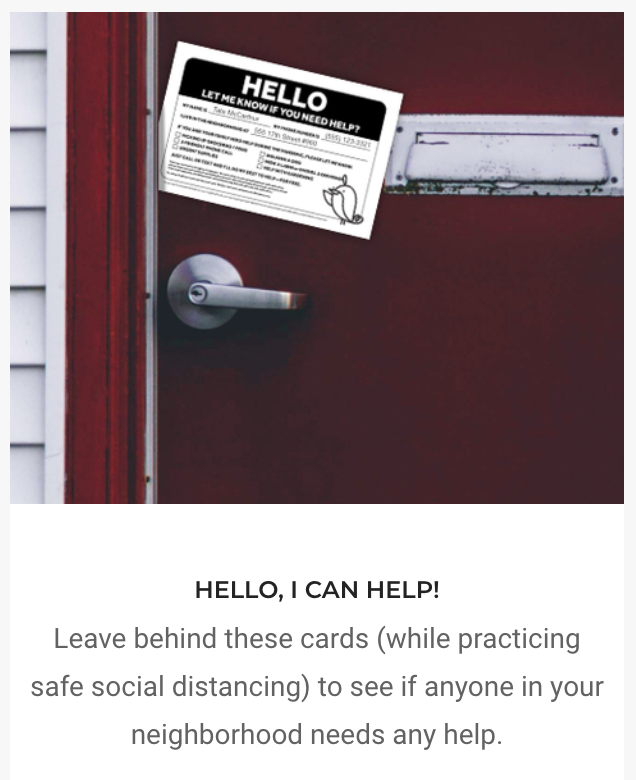
WKC #2: Send a Care Package or Order Essentials for Someone
Order essentials to be delivered to someone who may be in need during this time. This may be someone you know personally, or a place that you know thrives off of donations. Another option is to create a care package for someone who you know is working extra hard these days like a medical professional–again, this could be someone close to home (maybe your own family member!) or someone across the country.
WKC #3: Celebrate Earth Day (April 22)
With your extra time this month, you can celebrate Earth Day indoors by going through your belongings and donating any clothes or toys in good condition. Keeping these items out of landfills is a great way to celebrate this year! Other options that you can do throughout the month include washing dishes by hand, have a zero-waste lunch day, and sort trash and recyclables. There are additional ideas at Let Grow.
WKC #4: Plan a Virtual Celebration
There are many important events that are coming up in your friends’ and family members’ lives that we don’t want to forget just because we can’t celebrate how we usually would. Pick an upcoming event such as someone’s birthday, an anniversary, or a surprise thank you celebration and start planning! One thing that you can do is contact all of the person’s loved ones and ask them to send you a video, a message, or a physical note that you can collect and give to the person all at once on their special day. You can give them guidelines such as “tell them what you love about them” or “tell them a funny memory you have with them” or you can leave it open to the sender of the message. You could also organize all of the person’s loved ones to call them at different times throughout the day and deliver their messages personally. If you had enough time to receive physical letters, you could organize them into a book or a nice box for them to keep. Alternatively, you could plan a “surprise” virtual event (via Zoom or something similar) where all of the guests knew that it was a party for the special person. You can still “theme” the event even with everyone at home. It could be fancy or a fun costume theme, the possibilities are endless! Your special person will feel so loved that their day did not get overlooked just because everyone is inside. If this feels overwhelming to you, pick another friend or family member to help you brainstorm and plan what would be best for your special person!
DOWNLOADS
For Parents: Why is Kindness Important?
Being considerate of others will take your children further in life than any college degree.
Marian Wright Edelman
Being a considerate, kind person who thinks about others is a character trait that helps children form good relationships and leads to a happier life as an adult.
What does this mean for super competitive parents who want their children to succeed at all costs, even if it means cheating and being mean to others? It could be helpful for parents to know that research has clearly shown that kind people are happier people, and happier people, in turn, are more successful in life. In jobs and in future relationships, kindness will take our children “further in life than any college degree.”
Focusing on kindness needs to be a higher priority for everyone who cares about children.
In our cut-throat, competitive culture, where assertiveness and achievement are glorified and valued, focusing on developing kindness is often overlooked.
There are anti-bullying posters and speakers at most schools, but where is the message about the powerfully positive impact of kindness?
Parents and youth development professionals, including teachers, coaches, and camp staff, know that wording things positively and telling kids what we DO want them to do is far more effective than a list of “don’ts” and “nos.” So, why hasn’t this message translated into how we teach children to treat one another?
We’re talking with children a lot about not bullying each other, but we’re not talking with them enough about what we want them to be doing instead — which is, of course, to treat each other with respect and kindness. I propose that as parents and youth development professionals we flip the “anti-bullying” message into a “pro-kindness” one.
Ways to model and practice kindness
Get kids to focus on kindnesses that they have seen by asking them to point out kind acts they have witnessed or done.
Brainstorm with kids kind things they can do for others and help them follow through. Focus on small, easy kindnesses rather than huge things.
Talk with kids about how they feel after someone has done something kind for them or after they’ve done something kind for another person.
Questions to Ask Kids to Spur Conversations about Kindness
• Share something kind they’ve seen someone else do this past week.
• What’s the kindest thing someone has ever done for you?
• What are kind things we can do for our friends? Siblings? Parents? People we don’t know?
• How do you want to be remembered by your classmates and friends?
“You can’t live a perfect day without doing something for someone who will never be able to repay you.”
— John Wooden
This topic is so important to Gold Arrow Camp and to Sunshine that she dedicated an entire chapter of her book, Happy Campers, to it: Camp Secret #8: Make it Cool to be Kind. Each chapter of Happy Campers ends with five different “Bringing Camp Home” activities to consider trying in your family.
More Kindness Ideas
Read (or listen to) Wonder by R.J. Palacio
One of GAC counselors’ favorite read-aloud books is R.J. Palacio’s Wonder. Consider reading (or listening – Audible version is free right now if you sign up for a free Audible trial) to Wonder individually or as a family read-aloud. Get some popcorn and have a family movie night to watch the movie version after you finish reading.

Do you like Pinterest? Check out Sunshine’s Kindness board.
Five Ways to Raise Kind Children, Greater Good Science Center
Being Kind Makes Kids Happy, Greater Good Science Center
The Power of Kindness, American Camp Association
Happiness Tip: Commit to Kindness (Christine Carter, Raising Happiness)


